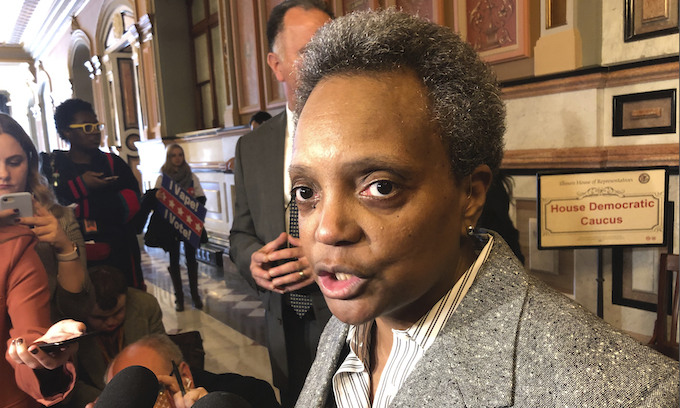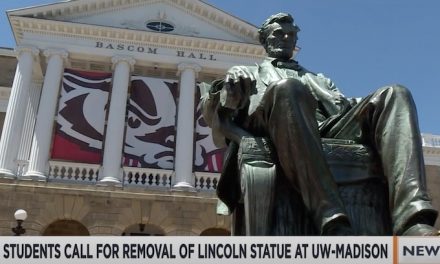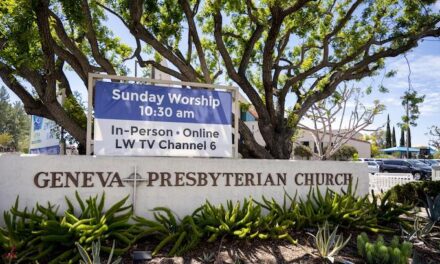Chicago Mayor Lori Lightfoot is considering a $94 million property tax increase, layoffs for more than 300 city workers and a gas tax hike as part of her plan to close a $1.2 billion budget deficit, sources told the Tribune.
Lightfoot also is considering about $500 million in refinancing city debt to help close the deficit, sources said.
The mayor is scheduled to explain her plans to close the city’s coronavirus-fueled budget deficit on Wednesday. One thing is clear: It won’t be easy.
Not for the city workers and taxpayers who will be asked to pay for the financial consequences of the coronavirus pandemic. And not for the mayor, who will need to push what could be a politically toxic plan through the City Council.
Though Lightfoot has kept details close to the vest, sources said a five-day furlough for all non-union city employees is under consideration as well as up to 350 layoffs. The layoffs would amount to roughly $13 million, sources said.
Lightfoot also is mulling a possible $77 million in cuts to unfilled positions, or more than 1,000 vacancies. The city also is weighing whether to ask Chicago Public Schools to reimburse the city for $40 million more in school pension contributions the city makes.
To close the deficit, the city also is counting on almost $300 million in improved fiscal management, a broad term that includes a variety of activities including improved collection practices. Lightfoot also could boost the city’s “cloud tax” up to 9%.
Publicly, Lightfoot’s kept details of her 2021 spending plan vague, saying all options are on the table while declining to get into specifics.
Sources noted the mayor’s plan won’t be final until she unveils it. A Lightfoot spokeswoman did not have an immediate comment.
But West Side Ald. Emma Mitts, 37th, who joined the City Council in 2000, expects this to be the most difficult budget process in which she has taken part. “We’ve never seen anything like this,” Mitts, who chairs the council License Committee, said of the COVID-19 financial calamity that has Chicago in its grip.
Experts said it’s unlikely the city will get much help from Springfield, which has profound revenue problems of its own, and a federal deal among congressional Democrats, Senate Republicans and President Donald Trump has been in limbo for months.
The city is likely to take a large TIF surplus and refinance debt to help close the deficit. But most of the tools at Lightfoot’s disposal will generate some controversy.
The mayor has been considering up to $200 million in cuts to Chicago’s roughly 32,000-person city government workforce, though layoffs and furloughs will draw criticism from labor unions and damage a segment of Chicago’s middle class.
If the mayor borrows to plug the shortfall, she likely will be criticized for putting the current financial burden on future generations. If the city refinances its debts then uses the money to shore up finances in the short term, she’ll likely be criticized for relying on one-time fixes.
If the mayor raises property taxes, she could face backlash from residents whose finances already have been walloped by the pandemic-fueled economic downturn.
If Lightfoot raises fines or fees, she could be criticized for walking back on her promises to end what she has called the city’s “addiction” to fines and fees.
Dipping into the city’s rainy day fund could negatively affect the city’s already dismal credit rating.
Laurence Msall, head of the Civic Federation, summed up the choices facing Lightfoot: “She doesn’t have very many good options.”
Sign up for The Spin to get the top stories in politics delivered to your inbox weekday afternoons.
Msall argued that the city can’t rely on a property tax increase and will need to cut redundant or nonessential services. He said the Fire Department needs to slim down its staffing requirements while the city also should be looking to Streets and Sanitation as well as the water department for cuts, though any such moves could run afoul of labor agreements.
“There’s going to have to be a significant reduction in personnel or personnel-related expenses,” he said.
Labor leaders will be trying to present the mayor enough cost-saving ideas in other areas to close the budget hole without layoffs or furloughs that will hurt their members. The mayor and union officials so far have been playing nice in public, and Bob Reiter, president of the Chicago Federation of Labor, said he wants to collaborate with the administration going forward to find solutions.
“We’re working with our affiliates, our rank-and-file workers, to identify ways to save the city money through efficiencies and the way services are delivered,” Reiter said. “At the end of the day, if we can take these ideas to the city and work with them to close the gaps they’ve identified without impacting the level of service or people’s livelihoods, that’s the goal.”
But Lightfoot’s Wednesday presentation of her plan will start the clock ticking in earnest on negotiating the final proposal the mayor will try to get through the City Council before the end of the year, so the kumbaya atmosphere between her and the unions will be put to the test in coming weeks.
The budget package likely will be the stiffest test the mayor has faced in trying to whip votes in the increasingly restive council. While she hasn’t lost a major vote yet, the 39-11 margin of her 2020 budget was relatively tight for a pretty painless spending plan.
Wrigleyville Ald. Tom Tunney, 44th, said he expects the mayor will have a hard time getting the budget passed. “It’s going to be tough to get to 26 (votes), I told her that as a member of her team,” said Tunney, whom Lightfoot picked to chair the key City Council Zoning Committee. “The idea of finding revenue in a depression-type economy, it’s almost impossible.”
And for employee layoffs or furloughs to “make a dent” in the deficit, police officers would need to be included, Tunney said. “Public safety is 60% of the budget. If you aren’t going to ask for the sacrifice from 60%, then what’s the point?” he asked.
Last year, many of the votes against Lightfoot’s spending plan came from progressive aldermen who said she didn’t do enough to increase funding for mental health services or to make corporations pay more toward the city’s bottom line.
Northwest Side Ald. Carlos Ramirez-Rosa, a democratic socialist, said he and like-minded aldermen will again try to push for “progressive revenue” while holding the line on property taxes. And a key agenda item will be to push Lightfoot to adopt “a robust program” to have mental health first responders, rather than Chicago police, be the first on the scene responding to mental health episodes.
Ramirez-Rosa, 35th, said it will be interesting to see how the mayor tries to build a coalition of aldermen to pass the 2021 budget. “Will she try to ally with us on the progressive side to shore up her support for a difficult budget by backing some of our key ideas, or will she turn to the more conservative members and try to get them to back her?” he said.
Also complicating Lightfoot’s budget woes is her combative relationship with aldermen. Lightfoot won office on a platform calling to curb their powers and has frequently criticized members of the City Council, who also complain that she doesn’t consult them.
Lightfoot acknowledged the troubled relationship earlier this year when she laid out the deficit, saying she needs to work better with people with whom she doesn’t agree. But since then, aldermen continue to grumble that she hasn’t done more to collaborate or keep them informed. She’s clashed privately with some aldermen.
The City Council Latino Caucus wrote Lightfoot earlier this year requesting $150,000 in extra funding for census-related media outreach. Lightfoot denied the request, and the caucus wrote back on Sept. 18 asking her to reconsider.
In a three-page response, Lightfoot again said “no” while highlighting the work her office had done to boost census outreach. But Lightfoot closed the letter with a shot at caucus chair Ald. Roberto Maldonado, 26th, writing, “outside of these occasional letters, alleging how I have somehow failed the Latino community in Chicago, I never hear from you, and rarely hear from other members of the Latino caucus.”
Lightfoot’s office said she’s met with him since the exchange of letters and it was productive.
Maldonado echoed the administration stance that they had a productive meeting but said he told the mayor, “When you don’t feel welcome, you don’t knock on the door.”
“I told her we don’t feel included or welcome in her administration,” he said.
But, Maldonado added, the mayor promised to work with the caucus.
“She said she’s willing to work with us, I take her at her word,” Maldonado said.
___
(c)2020 the Chicago Tribune
Visit the Chicago Tribune at www.chicagotribune.com
Distributed by Tribune Content Agency, LLC.
—-
This content is published through a licensing agreement with Acquire Media using its NewsEdge technology.



















Recent Comments